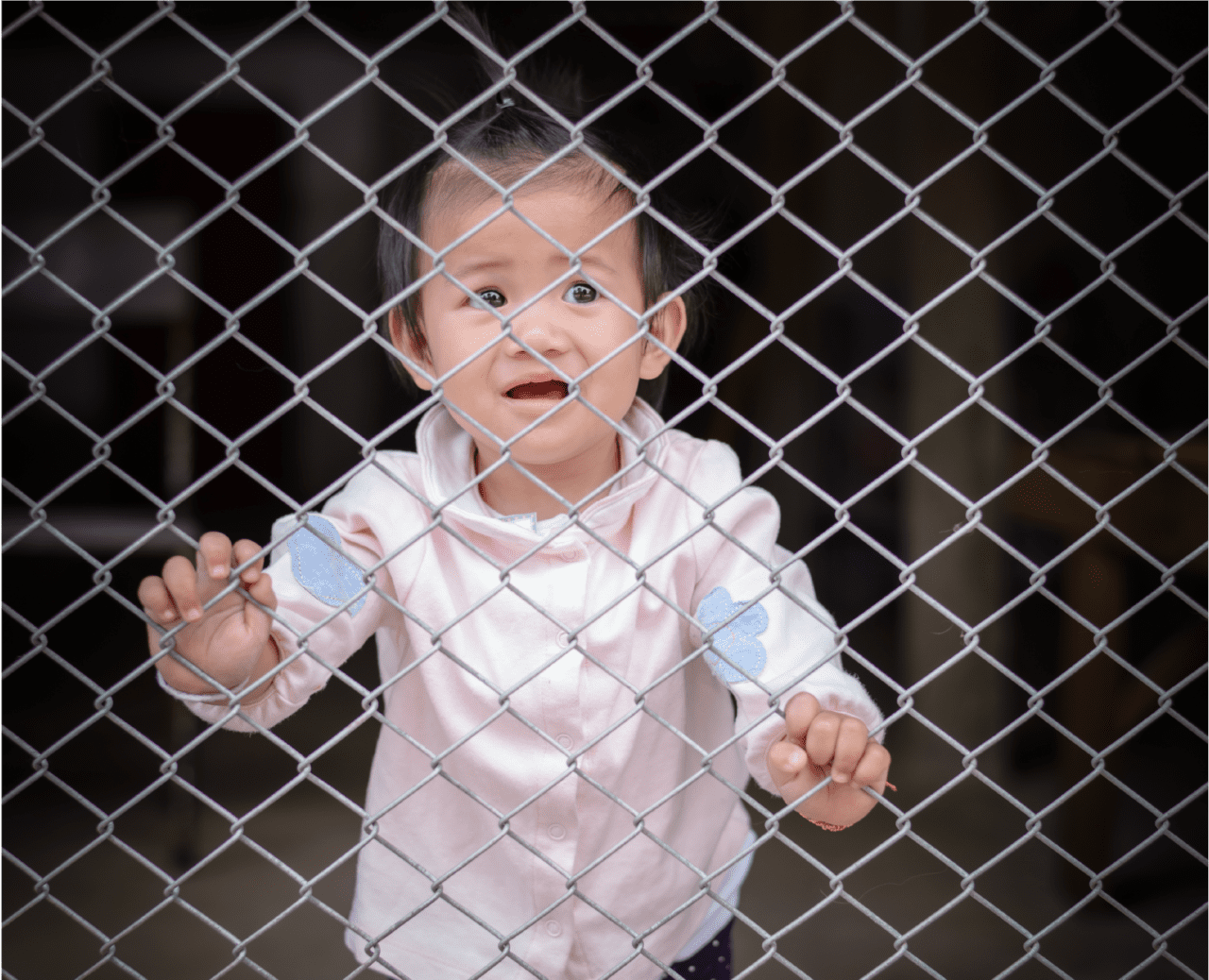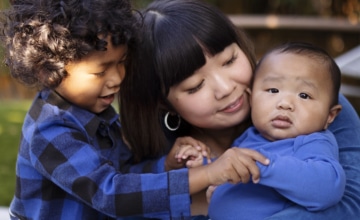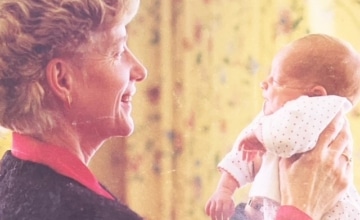In recent weeks, families, advocates, policymakers, and Administration personnel have given us a window through the walls of migrant detention camps, again focusing national attention on the life-altering experiences of families with children crossing the border. As we learn more about the young children being held in detention, often separated from their families and under reportedly grossly inadequate care, ZERO TO THREE is compelled to reiterate what decades of research clearly spell out about the impact of trauma on young children.
IN THIS RESOURCE
- Babies do not belong in congregate care or detention.
- Families who have been separated must be reunified immediately, and the practice of separating children from their parents must not continue.
- Young children who have been held in detention and/or have been separated from their families need access to voluntary infant and early childhood mental health services and support.
- Take Action
Babies’ brains develop at rapid fire speed, and what happens to them today informs who they will be tomorrow. Young children being held in detention at the border need our urgent attention and action. We must act on their behalf immediately.
There is a common misperception that babies are too young to be affected by the events around them. In truth, at the very foundation of babies’ development, intense trauma almost inevitably creates physiological damage to their brains and emotional damage that they will carry into the future – particularly if their needs are not met appropriately and immediately. Out of deep concern for young children, families, and the future of our country, ZERO TO THREE remains in strong, informed opposition to any practice that causes trauma and long-term harm to children. As we apply our research-based lens to current immigration practices and debate, we have three priorities:
Babies do not belong in congregate care or detention.
Research clearly shows that babies’ physical and social environments have a significant impact on their development. Even under the best circumstances, caring for young children outside of community-based family settings deprives them of the proper care they need to thrive. There is definitive scientific evidence that being held in congregate care (24-hour residential facilities for groups of children) or detention is harmful for young children. In congregate care, young children are stripped of critical one-on-one relationships that support healthy brain development. Placing babies and toddlers in detention centers, even with their families, is also not a viable option. The only safe placement for young children is in a family setting. In the unique circumstance of a young child entering our country with an adult deemed to be dangerous or unfit to provide care, the young child must remain in a community-based family setting, such as with foster parents.
- Congregate Care: Science tells us that infants and toddlers need consistent and personalized care from trusted, loving adults. When we place migrant babies in congregate care, as recent reports indicate, we deprive them of the nurturing relationships they need and derail their development. In such group settings, multiple adults are responsible for the care of a child, working rotating shifts, and are not individuals that the child knows or trusts. Studies from around the world show that children placed in congregate care settings experience serious compromises in cognitive, language, and especially, social development. Landmark studies of young children exposed to institutional rearing in Romania show alterations in the structure and functioning of their brains, and serious psychiatric and social impairments lasting into adulthood.
- Family Detention: Sending infants and toddlers to institutional detention is detrimental to their health and well-being. The contention that children are only temporarily being held in detention facilities does nothing to change the impact on their development. Recent reports from detention camps indicate that children, including babies, are not being provided with the basics of hygiene and care, including regular diapering and nutritious food. Beyond these violations to basic needs, detention places children in an environment of confinement, deprivation of stimuli – and in some cases, overstimulation – and developmentally inappropriate and often harsh treatment, which cause severe stress for both the children and their caregivers. Historically, evaluations of children who have been detained, even with their families, reveal alarming outcomes, with many children displaying developmental delays and signs of emotional disturbance such as a short attention span, aggression, withdrawal, difficulty coping, and learning difficulties. If the legal protections established for children’s care in such facilities (including time limits and regulations) are not adhered to, or are reversed, infants, toddlers, and their families in detention facilities are vulnerable to prolonged stays, abuse, and neglect. Further compounding the risks to their well-being, families in detention may face inadequate access to services including the medical and mental health care they so desperately need.
Families who have been separated must be reunified immediately, and the practice of separating children from their parents must not continue.
While the practice of separating children from their families was prohibited by Executive Order, it is evident from reports out of detention camps that this practice continues, with very young children removed from the adults who care for them, and reportedly turned over to unrelated older children for their care. While the rapid development of infants and toddlers makes them particularly vulnerable to trauma, families offer an essential buffer to those experiences. When children are separated from their parents after crossing the border, that primary bond is severed. This causes stress hormones to flood babies’ brains, disrupting their neurological circuitry in ways that profoundly affect their short- and long-term physical and emotional health, and their ability to form relationships and learn. That trauma is compounded when children are placed in the care of strangers untrained to care for young children, either older children or adults who are ill-equipped to protect them, much less nurture their healthy development. The broad consensus of researchers and practitioners is that to continue to separate families in this way is tantamount to child abuse. Additionally, children who have already been separated must be immediately reunited with their caregivers, providing them with the close relationship they need to cope with the trauma they have undergone.
Young children who have been held in detention and/or have been separated from their families need access to voluntary infant and early childhood mental health services and support.
Decades of psychological and brain research have demonstrated that adverse experiences during the first three years, including forced parental separation and placement in incarceration-like settings, can have profound immediate and long-term harm on child development. In the short-term, children may experience anxiety, depression, and self-regulatory issues, including sleeplessness or eating issues. Over time, they may show regression in behavior and cognition, and demonstrate symptoms of post-traumatic stress disorder. This type of trauma, particularly when not addressed by an experienced and trusted clinician, has severe implications for both physical and emotional health over time, increasing young children’s risk for learning difficulties, problems forming relationships, and adult health issues. Caregivers, who are also deeply psychologically and physiologically impacted by their recent experiences, also need support to provide their children with the care they need. When families have been separated, reunification itself may be difficult, as separated young children don’t have the capacity to understand what has transpired and may feel abandoned by their parents. This is complex work, requiring a focus on both parent and child, and requiring specialized expertise and developmentally appropriate, evidence-based support. Infant and early childhood mental health professionals across the United States are able to help, but they need pathways to families. Individuals interested in connecting families with IECMH professionals can utilize this directory to find a contact in their state.
Unlike with older children in The Office of Refugee Resettlement custody, who are afforded mental health services only when they exhibit signs of distress, it should be assumed that any young child who has been detained with family members or separated from them has experienced trauma. That child’s care should be guided by an understanding of infant and early childhood mental health, and observation by a trained specialist should be the rule rather than the exception.
As experts in early childhood development, we know that every day matters for the well-being of babies and toddlers who have experienced trauma at the border and elsewhere. Appropriate support and treatment are urgently needed, and time is truly of the essence for the protection and care of young children’s rapidly developing brains. As we consider babies at the border, we must use what decades of science and research tell us to inform policy and practice decisions right now. Their future – and the best interests of our nation – depend on it.



